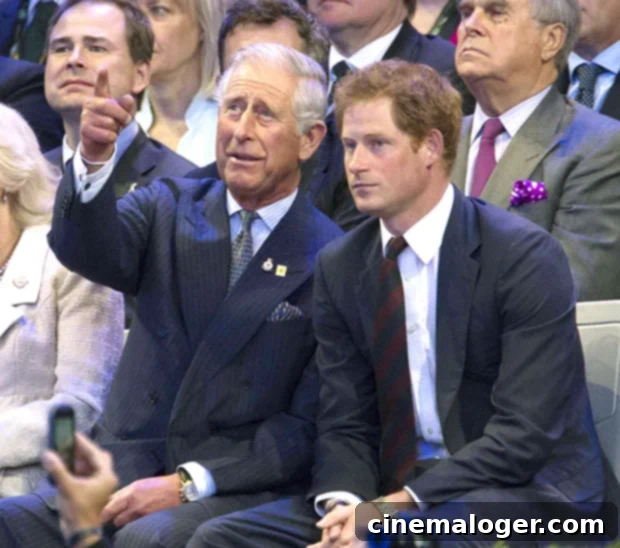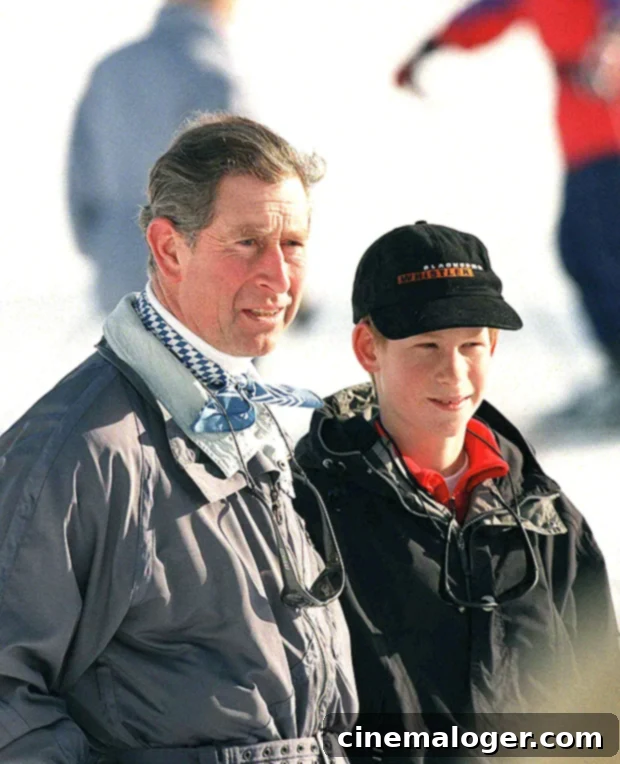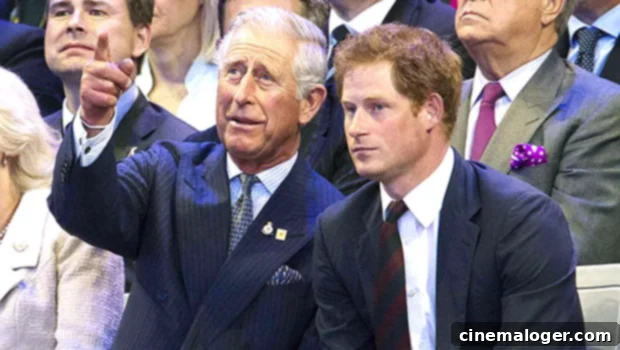Prince Harry’s Paternity: Unpacking King Charles’s “Unfunny Joke” and Major James Hewitt Rumors from ‘Spare’
If you purchase an independently reviewed product or service through a link on our website, we may receive an affiliate commission.
For our affiliate policy, click
here.
In a series of candid and often startling revelations from his groundbreaking memoir,
Prince Harry
has brought to light a deeply personal and long-standing source of distress: the persistent rumors surrounding his true paternity. Among the most talked-about admissions in his book,
Spare,
Harry details an incident where his father,
King Charles
(then Prince Charles), made a joke that directly referenced the tabloid-fueled speculation linking Harry’s parentage to Major James Hewitt. This particular anecdote underscores the profound impact that relentless media scrutiny and internal family dynamics have had on the Duke of Sussex throughout his life.
King Charles’s “Unfunny Joke” and Its Emotional Impact
Prince Harry recounts this painful episode in Spare, detailing how his father would often tell stories, but one in particular stood out for its cutting nature. Charles’s joke, as Harry describes it, centered on the widespread belief among tabloid readers that Major James Hewitt, one of Princess Diana’s “former lovers,” was Harry’s biological father. The then-Prince of Wales would reportedly conclude this story with a philosophical flourish, asking: “If this mental patient could be so thoroughly convinced of his identity, no less than Pa, it raised some very Big Questions indeed.” Harry, now 38, further elaborated on the alleged exchange, quoting his father: “Who could say which of us was sane? Who could be sure they weren’t the mental patient, hopelessly deluded, humored by friends and family? Who knows if I’m really the Prince of Wales? Who knows if I’m even your real father? Maybe your real father is in Broadmoor, darling boy!”
For Harry, this was far from amusing. He describes the joke as “remarkably unfunny,” especially given the pervasive and hurtful rumors that had plagued his childhood and adolescence. While King Charles would “laugh and laugh,” Harry found himself confused and deeply affected by the comment. This incident, shared globally with the release of Spare on January 10, 2023, offered an intimate glimpse into the complex and often strained relationship between father and son, highlighting the emotional toll of living under the royal spotlight and constant public speculation. The casual nature of such a sensitive topic coming from his own father further emphasizes the unique challenges Harry faced in understanding his identity and place within the Royal Family.

The Persistent Paternity Rumors: Major James Hewitt and Princess Diana
The “unfunny joke” was, of course, rooted in years of fervent tabloid speculation regarding Major James Hewitt. Hewitt, a former Household Cavalry officer, became infamous for his affair with
Princess Diana.
In his own book and numerous media appearances, Hewitt confirmed that his romantic relationship with Diana lasted for four years, from 1986 to 1990. However, this timeline is critically important in debunking the paternity rumors. Prince Harry was born on September 15, 1984, a full two years before Major Hewitt’s affair with the
late Princess of Wales
allegedly began. This chronological discrepancy serves as the foundational argument against the widespread claims.
Despite this clear timeline, media outlets, particularly tabloids, persistently fueled the rumors. They frequently published side-by-side photographs of Major Hewitt and Prince Harry, highlighting what they deemed an “uncanny resemblance.” This comparison often focused on their shared physical characteristics, most notably their bright red hair. The media’s portrayal suggested a striking similarity that, for many readers, seemed to defy the official narrative of Harry’s parentage. This visual manipulation, combined with the sensational nature of royal scandals, ensured the rumors remained a constant feature of public discourse around Harry. The continuous propagation of these stories created an environment where Harry’s very identity was subjected to public debate and scrutiny, a burden few individuals, let alone a young prince, should have to endure.
Harry’s Definitive Rebuttal: A Mother’s Truth
Harry squarely addresses these rumors in Spare, directly challenging the narrative that had been so cruelly woven around his birth. He attributes the genesis of these stories to two main factors: Major Hewitt’s “flaming ginger hair” and, more disturbingly, an element of “sadism” within the tabloid culture. Harry explicitly states, “Tabloid readers were delighted by the idea that the younger child of Prince Charles wasn’t the child of Prince Charles.” This observation points to the darker motivations behind the sensationalism – a desire to undermine the Royal Family, to create scandal, and to delight in the potential humiliation of its members.
For Harry, the clarification of his parentage is not just a matter of public record but a deeply personal affirmation. He doubles down on the factual timeline, emphasizing that his mother, Princess Diana, and Major Hewitt did not meet until “long after” he was born. This crucial detail, repeatedly overlooked or deliberately ignored by those propagating the rumors, is central to Harry’s narrative. His insistence on this point is not merely a factual correction; it’s a defiant stand against years of speculation that questioned his legitimacy and, by extension, his place within the monarchy. The persistent nature of this “joke,” as Harry calls it, left him questioning why people found such joy in mocking his existence and his family’s struggles.

The Royal Family, Tabloid Media, and Identity
The sustained focus on Harry’s paternity is a stark example of the unique pressures faced by members of the British Royal Family. From birth, their lives are not entirely their own, but become subject to intense public scrutiny, often fueled by an insatiable appetite for gossip and scandal. The media’s role in perpetuating the Major Hewitt rumors highlights a troubling aspect of this dynamic: the willingness to disregard inconvenient facts in favor of a more sensational narrative. Harry’s red hair, a genetic trait, became a convenient visual link, overriding the chronological evidence.
The context of King Charles’s joke further complicates this narrative. While perhaps intended as a lighthearted jest by Charles, its impact on Harry was anything but. It revealed a deeper truth about how these rumors penetrated even the most private family conversations, turning a deeply personal and potentially hurtful matter into a recurring family anecdote. This experience undoubtedly contributed to Harry’s complex relationship with his family and his ultimate decision to step back from senior royal duties. He sought a life where his identity would not constantly be called into question or be a source of amusement for others, even within his own family.
Moreover, the ‘Spare’ memoir as a whole serves as Harry’s attempt to reclaim his narrative and present his version of events. The book is replete with instances where Harry feels misunderstood, misrepresented, or emotionally neglected. The paternity rumor, and his father’s joke about it, are powerful examples of the insidious ways in which external narratives can shape internal family dynamics and personal identity. By explicitly stating that his mother and Major Hewitt met “long after I was born,” Harry not only corrects a historical inaccuracy but also asserts his birthright and lineage, challenging decades of speculation that sought to delegitimize his position as a prince.
Beyond the Headline: The Long-Term Impact on Prince Harry
The relentless questioning of Prince Harry’s paternity had a profound and lasting psychological impact on him. Growing up, surrounded by whispers and media headlines, must have been incredibly isolating and confusing for a young boy. Such rumors can sow seeds of doubt, affect one’s sense of belonging, and even influence self-worth. Harry’s decision to dedicate significant space in Spare to this particular issue speaks volumes about how deeply these unsubstantiated claims affected him. It wasn’t just a fleeting rumor; it became a part of his public identity, often overshadowing his achievements and contributions.
His narrative in Spare is a plea for understanding and an assertion of his truth. By sharing the raw emotion and confusion he experienced, Harry aims to humanize himself amidst the often-cold machinery of the monarchy and the relentless pursuit of sensational stories by the media. He emphasizes that the “joke” was always on him, the target of cruel speculation, rather than on those who propagated it. This chapter in his memoir provides a crucial insight into the emotional landscape of a prince grappling with his origins in the full glare of the world’s attention. His clear and unequivocal denial serves as a definitive closure to a rumor that has followed him for decades, allowing him to finally articulate his truth.
Conclusion: Reclaiming Identity Through Truth
Prince Harry’s candid revelation in Spare regarding King Charles’s joke about his paternity and the Major James Hewitt rumors serves as a powerful testament to the challenges of royal life. It highlights the enduring power of tabloid narratives and the profound emotional impact they can have on individuals, even within the highest echelons of society. Harry’s definitive statement that Princess Diana and Major Hewitt met well after his birth aims to put an end to decades of hurtful speculation.
This episode, along with many others detailed in his memoir, paints a picture of a prince striving to define his own identity amidst immense public pressure and complex family dynamics. By sharing these intimate details, Harry not only seeks to correct historical inaccuracies but also to heal personal wounds, offering readers a rare and unfiltered look into the life of a royal who, despite his privileged position, has grappled with universal questions of belonging, identity, and truth. The conversation around his paternity is a microcosm of the larger themes in Spare: a desire for authenticity and a rebellion against the constraints and often cruel narratives imposed by a life lived in the public eye.
